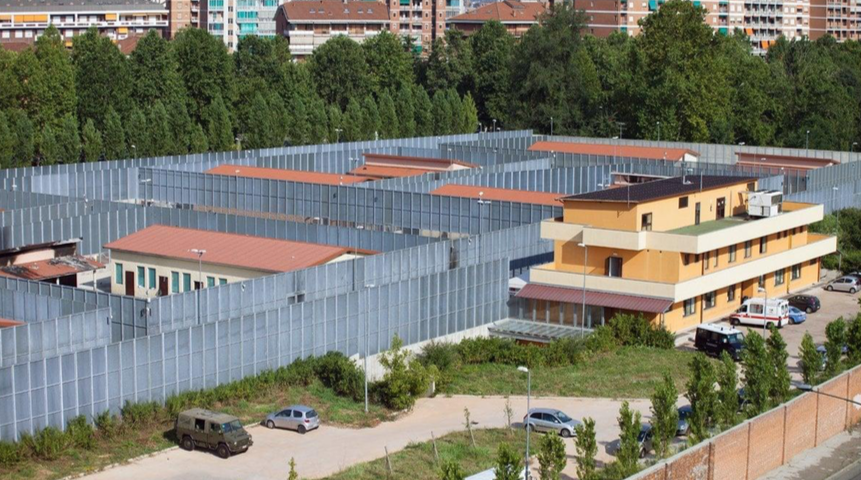
UPDATE ON THE CLOSURE OF THE TURIN CPR ON 12.3.2023
Published on No Cpr Torino on 12/03
In the first days of March the last seven people who were imprisoned inside the CPR (detention centre) of corso Brunelleschi, in Torino, were transferred.
We don’t know at the moment if they have been deported or if they are inside one of the nine administrative detention centres left in Italy: Gradisca d’Isonzo, Milan via Corelli, Rome Ponte Galeria, Bari Palese, Brindisi Restinco, Potenza Palazzo S. Gervasio, Caltanissetta Pian del Lago, Trapani Milo and Macomer in Sardinia.
What we do know is that after the 20 February riot that rendered the green area unfit for use (the only one left with full capacity after the riots of 4 and 5 February), the seven people who remained imprisoned in the centre collectively went on hunger strike in the following days to protest against the torture imposed daily on them by the managing body ORS Italia. During those weeks, the management of the CPR also restricted telephone communication with the outside world in every way. A hunger strike undertaken with determination and courage against the conditions of detention and the violence imposed by the Turin Police Headquarters responsible for the beatings and continuous humiliation that the detainees experienced on their skin.
And while inside the CPR in Turin seven people endangered their lives by choosing the hunger strike as an extreme form of protest, outside newspapers and politicians used the news of the closure of the largest administrative detention centre in northern Italy, thus silencing the inmates still inside and the reasons for the protest. The umpteenth attempt to annul the detainees and their personal stories through the creation of the usual deviant narrative that aims to divert attention from reality with the aim of hiding the torture that takes place inside the walls from the respectable community.
After the riots at the beginning of February, 25 people were transferred from Turin to the CPR in Macomer. Some of them have called us on the phone in recent days to tell us that they have been on hunger strike for several days to protest against the conditions of detention. Inside the centre there are about fifty detainees divided into two areas, while five people are in an isolation section with plain cells. Most of them have recently arrived in Europe and come mainly from Algeria. They told us that the administration of psychotropic drugs is less than in the Turin CPR but the detention conditions are worse because the facility was a prison, with also a high security section, closed in 2014 due to structural deficiencies and converted to CPR in 2020. Some cells are underground and searches are daily. The managing body Cooperativa Sociale Ekene does not provide blankets or winter clothes, forcing the inmates into the cold. During the night, they told us that many of them are forced to use mattresses to cover themselves.
Besides the CPR in Macomer, the CPR in Palazzo San Gervasio in the province of Potenza was also used as a destination for transfers after the riots at the beginning of February. A detainee in Turin called us on the phone after the transfer.
He told us that those who opposed the administration of the therapy were taken inside a room where they were immobilised and violently forced by the guards to swallow a dose of Rivotril in front of the inspector on duty.
Inside the CPR of Palazzo San Gervasio there are currently about one hundred and fifty inmates surviving in conditions of overcrowding and neglect imposed by the managing body Engel Italia.
The Trapani Milo’s CPR was also one of the destinations of the post-revolt transfers. From a contact with a person confined in the centre after the 20 February riot in Corso Brunelleschi, we learnt that the structure and management is one of the worst so far.
There are about 200 people in the centre, many of whom have just landed in Sicily. The cells are single, making internal communication between inmates impossible during most of the day.
The sanitary conditions and the daily harassment suffered by the inmates make detention extremely afflictive. The guards threaten, constantly beat them and force them to take various sedatives every day.
It is neither possible to talk to social workers nor psychologists. In addition, the management prevents the appointment of lawyers other than those provided by the centre.
⚫️ In the days following the riots at the beginning of February, in addition to transfers to other CPRs located throughout the country, deportations continued. After being repatriated on a scheduled flight to his country, a young man called us on the phone to tell us about his detention experience in the Turin lager.
On the No Cpr Torino website, the audios of the phone calls
Despite the attempt to annihilate inmates through the use of violence and psychotropic drugs, the administrative detention system has one less facility thanks to the strength and courage of the rioters.
DETETION CENTRES ARE CLOSED WITH FIRE
